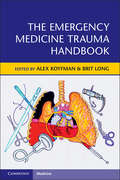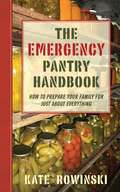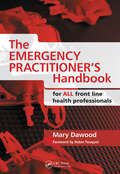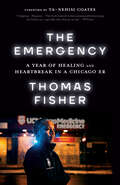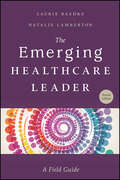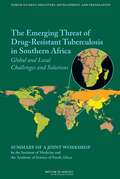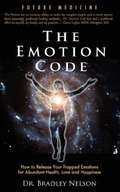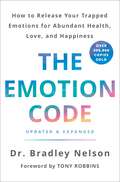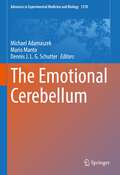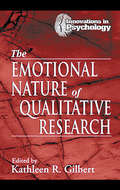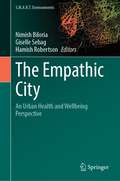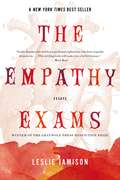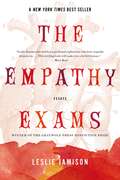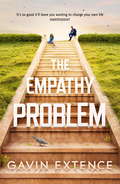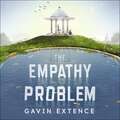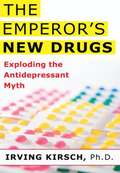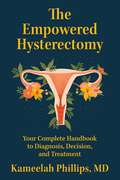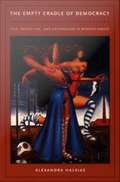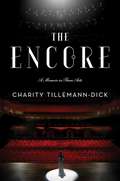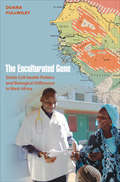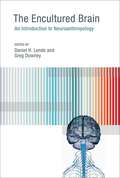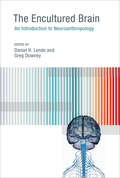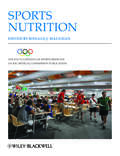- Table View
- List View
The Emergency Medicine Trauma Handbook
by Brit Long Alex KoyfmanTrauma is a leading cause of death and disability around the world, and the leading cause of death in those aged under forty-five years. Conditions such as airway obstruction, hemorrhage, pneumothorax, tamponade, bowel rupture, vascular injury, and pelvic fracture can cause death if not appropriately diagnosed and managed. This essential book provides emergency physicians with an easy-to-use reference and source for traumatic injury evaluation and management in the Emergency Department. It covers approaches to common, life-threatening, and traumatic diseases in the Emergency Department, for use on shift and as a reference for further learning. Each chapter includes a succinct overview of common traumatic injuries, with evaluation and management pearls and pitfalls. Highly illustrated with images from one of the busiest trauma centers in the US, and featuring expert contributions from a diverse set of attending physicians, this is an essential text for all emergency medicine practitioners.
The Emergency Pantry Handbook: How to Prepare Your Family for Just about Everything
by Kate Rowinski Jim RowinskiIn today’s world, anything can happen—medical emergencies, power outages, natural disasters. In less time than it takes to sign off on an insurance form, the world as we know it can be brought to a standstill. There can be no question: It’s best to be prepared. The Emergency Pantry Handbook by cooking expert and readiness enthusiast Kate Rowinski offers tips, techniques, and advice on how to keep your family safe, well-fed, and fully supplied in the event of any crisis. With simple instructions, Rowinski demonstrates how to create an emergency strategy; how to protect your house, documents, and keepsakes; and how to prepare for specific disasters. Offering a unique twist on preparation handbooks, Rowinski focuses on food storage and cooking—put simply, how to plan nutritional emergency meals and avoid “making due” on canned meats and chocolate bars. The Emergency Pantry Handbook details:· Storage techniques · Personalizing your food plan · Stockpiling, shelf life, and rotation · Pickling, canning, sprouting, and drying · Making delicious dinners out of your storage pantry Whether a disaster lasts for twenty-four hours or twenty-four weeks, The Emergency Pantry Handbook is the ultimate guide to keeping your family eating healthily and maintaining proper nutrition, even in the worst of circumstances.
The Emergency Practitioner's Handbook: For All Front Line Health Professionals
by Mary DawoodThe development of urgent care centres within emergency departments and the proliferation of minor injury units and walk in centres in recent years has led to a parallel rise in Emergency Practitioners (EPs) whose professional backgrounds range between nursing, physiotherapy and paramedical sciences with nurses being the predominant group. These hybrid groups of clinicians combine nursing and medical knowledge to deliver timely effective care to patients presenting with a wide range of injuries and illness. This handbook is an ideal companion and aide memoire for daily practice, and an essential tool for EPs - enabling them to assess, diagnose, treat and discharge or refer the patient effectively. Written by emergency nurse practitioners who understand the thought processes and complexities of clinical decision making, this guide offers straightforward practical advice, particularly for those in isolated nurse led units or those working in a pressurised environment of the emergency department. General Practitioners and foundation year 2 doctors also increasingly work in emergency/urgent care settings and will find this guide invaluable for current, easy to access information.
The Emergency: A Year of Healing and Heartbreak in a Chicago ER
by Thomas FisherThe riveting, pulse-pounding story of a year in the life of an emergency room doctor trying to steer his patients and colleagues through a crushing pandemic and a violent summer, amidst a healthcare system that seems determined to leave them behind ONE OF NEWSWEEK&’S MOST ANTICIPATED BOOKS OF 2022As an emergency room doctor working on the rapid evaluation unit, Dr. Thomas Fisher has about three minutes to spend with the patients who come into the South Side of Chicago ward where he works before directing them to the next stage of their care. Bleeding: three minutes. Untreated wound that becomes life-threatening: three minutes. Kidney failure: three minutes. He examines his patients inside and out, touches their bodies, comforts and consoles them, and holds their hands on what is often the worst day of their lives. Like them, he grew up on the South Side; this is his community and he grinds day in and day out to heal them. Through twenty years of clinical practice, time as a White House fellow, and work as a healthcare entrepreneur, Dr. Fisher has seen firsthand how our country&’s healthcare system can reflect the worst of society: treating the poor as expendable in order to provide top-notch care to a few. In The Emergency, Fisher brings us through his shift, as he works with limited time and resources to treat incoming patients. And when he goes home, he remains haunted by what he sees throughout his day. The brutal wait times, the disconnect between hospital executives and policymakers and the people they're supposed to serve, and the inaccessible solutions that could help his patients. To cope with the relentless onslaught exacerbated by the pandemic, Fisher begins writing letters to patients and colleagues—letters he will never send—explaining it all to them as best he can. As fast-paced as an ER shift, The Emergency has all the elements that make doctors&’ stories so compelling—the high stakes, the fascinating science and practice of medicine, the deep and fraught interactions between patients and doctors, the persistent contemplation of mortality. And, with the rare dual perspective of somebody who also has his hands deep in policy work, Fisher connects these human stories to the sometimes-cruel machinery of care. Beautifully written, vulnerable and deeply empathetic, The Emergency is a call for reform that offers a fresh vision of health care as a foundation of social justice.
The Emerging Healthcare Leader: A Field Guide, Second Edition (ACHE Management)
by Laurie BaedkeIn the ever-changing healthcare environment, the profession of healthcare management needs strong leaders who will rise to the challenges of today and carry organizations into the future. The Emerging Healthcare Leader: A Field Guide is an essential resource for those in the early stages of becoming a healthcare leader. Packed with tactics, tips, and illuminating straightforward examples, this book is an indispensable guide to building your career in healthcare leadership. Honestly and authentically, authors Laurie Baedke and Natalie Lamberton offer practical suggestions and share anecdotes, personal stories, and important lessons learned from their own professional experiences. The book covers: • Developing self-awareness• Practicing self-management • Cultivating your personal brand• Launching your career• Understanding and refining your leadership style• Learning and rebounding from failures• Maximizing your internship opportunities• Mastering the interview process This second edition includes new chapters on emotional intelligence and successful onboarding. Valuable content on technology, social media, online presence, networking, and professional decorum has been updated and expanded. Four new “Notes to My 25-Year-Old Self” from distinguished healthcare leaders are sources of additional inspiration and insight for readers. Whether you’re a newcomer to healthcare management or transitioning into a leadership role, The Emerging Healthcare Leader: A Field Guide provides the advice and ideas you need to advance your career. “More than theory, The Emerging Healthcare Leader: A Field Guide is your road map for that journey. A refreshing and practical tool, this should be your handbook, your back-pocket how-to resource as you traverse the early years of your leadership career.” —Rulon F. Stacey, PhD, FACHE, Chairman (2011–2012), American College of Healthcare Executives
The Emerging Threat of Drug-Resistant Tuberculosis in Southern Africa: Global and Local Challenges and Solutions - Summary of a Joint Workshop by the Institute of Medicine and the Academy of Science of South Africa
by Institute of Medicine of the National AcademiesTuberculosis (TB) kills approximately 4,500 people worldwide every day. While most cases of TB can be treated with antibiotics, some strains have developed drug resistance that makes their treatment more expensive, more toxic and less effective for the patient. The IOM Forum on Drug Discovery, Development, and Translation and the Academy of Science of South Africa held a workshop to discuss ways to fight the growing threat of drug-resistant TB.
The Emotion Code: How to Release Your Trapped Emotions for Abundant Health, Love and Happiness
by Bradley B. NelsonA renowned holistic physician and lecturer skillfully lays bare the inner workings of the subconscious mind to reveal how emotionally charged events from the past can become "trapped emotions"--emotional energies that literally inhabit one's body. Dr. Nelson explains clearly and concisely how trapped emotions can create pain, malfunction, and eventual disease--and ways of ridding oneself of that baggage.
The Emotion Code: How to Release Your Trapped Emotions for Abundant Health, Love, and Happiness (Updated and Expanded Edition)
by Bradley Nelson"I believe that the discoveries in this book can change our understanding of how we store emotional experiences and in so doing, change our lives. The Emotion Code has already changed many lives around the world, and it is my hope that millions more will be led to use this simple tool to heal themselves and their loved ones."—Tony RobbinsIn this newly revised and expanded edition of The Emotion Code, renowned holistic physician and lecturer Dr. Bradley Nelson skillfully lays bare the inner workings of the subconscious mind. He reveals how emotionally-charged events from your past can still be haunting you in the form of "trapped emotions"—emotional energies that literally inhabit your body. These trapped emotions can fester in your life and body, creating pain, malfunction, and eventual disease. They can also extract a heavy mental and emotional toll on you, impacting how you think, the choices that you make, and the level of success and abundance you are able to achieve. Perhaps most damaging of all, trapped emotional energies can gather around your heart, cutting off your ability to give and receive love. The Emotion Code is a powerful and simple way to rid yourself of this unseen baggage. Dr. Nelson’s method gives you the tools to identify and release the trapped emotions in your life, eliminating your “emotional baggage,” and opening your heart and body to the positive energies of the world. Filled with real-world examples from many years of clinical practice, The Emotion Code is a distinct and authoritative work that has become a classic on self-healing.
The Emotional Cerebellum (Advances in Experimental Medicine and Biology #1378)
by Mario Manto Michael Adamaszek Dennis J. L. G. SchutterEmotions represent a critical aspect of daily life in humans. Our understanding of the mechanisms of regulation of emotions has increased exponentially these last two decades. This book evaluates the contribution of the cerebellum to emotion. It outlines the current clinical, imaging and neurophysiological findings on the role of the cerebellum in key aspects of emotional processing and its influence on motor and cognitive function and social behavior.In the first section, the reader is introduced to the contributions of the cerebellum to various emotion domains, from emotion perception and recognition to transmission and encoding. Subsequent chapters provide a comprehensive picture of the neurophysiology and topography of emotion in the cerebellum and illustrate the convergence of theoretical and empirical research. Additional chapters address the cerebellum's involvement in emotional learning, emotional pain, emotional aspects of body language and perception, and its relations to social cognition including morality, music, and art. Finally, neuropsychiatric aspects of the cerebellum's influence on mood disorders and the current state of therapeutic options, including noninvasive stimulation approaches, complete the overview. This is the first book summarizing the current state of knowledge on the contribution of the cerebellum to important aspects of emotion. It is an essential reference for students, trainees, neuroscientists, researchers, and clinicians in neuroscience, neurology, neurosurgery and psychology involved in the study of emotions. The authors are renowned scientists in the field of cerebellar research.
The Emotional Nature of Qualitative Research
by Kathleen R. GilbertThis book focuses on the place sand purpose of emotions in the research process, and explores the appropriate boundaries. Designed to explore how to manage the emotional content of research, the text service as a supplemental to qualitative research method courses, and is an excellent reference for the professional as well.
The Empathic City: An Urban Health and Wellbeing Perspective (S.M.A.R.T. Environments)
by Nimish Biloria Giselle Sebag Hamish RobertsonThis book has a primary focus on inclusions for solutions to problems and not just more on the nature of the current and emerging problems that most other competing titles present. The book is also a true global representation of challenges and opportunities that have been encountered, addressed, and critiqued from a wide variety of contributors rather than academicians per se. In doing so, rather than focusing on techno-centric prowess and associated case studies of the west (as is the case in most competing titles), the book also equally emphasizes upon the vulnerabilities and mitigating solutions being developed and tested in the under-developed and developing nations. Besides this, the book also acquires an ‘Equity’ oriented focus and hints upon sustainable, inclusive modes of shaping our built environment throughout the contributing chapters. The book is also unique in the way it combines the chosen themes to provide a holistic coverage of the broader determinants of urban health and wellbeing, thus being better positioned to address SDG3 within one compact volume. The book also differs from a typical conference proceeding or a non-peer reviewed book since the book’s highly theme specific approach is curated by a scientific peer review committee to carefully maintain diversity of contributions to the book. Cities have a profound power to support or hinder human health and wellbeing in countless ways. Achieving greater health equity has emerged in recent years as a key priority and consideration when designing cities to promote health and wellbeing, although there is a dearth of evidence and practical examples of research translation to guide cities and communities. The book accordingly exemplifies a pluralistic approach to achieving urban health equity which recognises and addresses critical aspects of geography, age, race, background, socioeconomic status, disability, gender etc. With interdisciplinary science clearly pointing to the role of the neighbourhood environment as one of the most important health determinants, this book will undoubtedly lead the next generation of urban health actors to build contextually responsive, equitable, empathic cities to benefit residents around the world. The book, rather than being focused purely on academic propositions for building equitable cities, offers a unique multi-stakeholder perspective by collaborating with the International Society for Urban Health’s 18th International Conference on Urban Health. This unique collaboration allows access to hundreds of scientists, architects, urbanists, multilaterals, policymakers, non-profit leaders, and grassroots organizers. The book captures the voices and concerns of such diverse cross-sectoral professionals and showcases findings that turn evidence into action and impact in communities around the world.Chapter 14 is available open access under a Creative Commons Attribution 4.0 International License via link.springer.com.
The Empathy Exams: Essays
by Leslie JamisonFrom personal loss to phantom diseases, a bold and brilliant collection, winner of the Graywolf Press Nonfiction Prize<P> Beginning with her experience as a medical actor who was paid to act out symptoms for medical students to diagnose, Leslie Jamison’s visceral and revealing essays ask essential questions about our basic understanding of others: How should we care about each other? How can we feel another’s pain, especially when pain can be assumed, distorted, or performed? Is empathy a tool by which to test or even grade each other? By confronting pain—real and imagined, her own and others’—Jamison uncovers a personal and cultural urgency to feel. She draws from her own experiences of illness and bodily injury to engage in an exploration that extends far beyond her life, spanning wide-ranging territory—from poverty tourism to phantom diseases, street violence to reality television, illness to incarceration—in its search for a kind of sight shaped by humility and grace.
The Empathy Exams: Essays
by Leslie JamisonFrom personal loss to phantom diseases, The Empathy Exams is a bold and brilliant collection, winner of the Graywolf Press Nonfiction PrizeA Publishers Weekly Top Ten Essay Collection of Spring 2014Beginning with her experience as a medical actor who was paid to act out symptoms for medical students to diagnose, Leslie Jamison's visceral and revealing essays ask essential questions about our basic understanding of others: How should we care about each other? How can we feel another's pain, especially when pain can be assumed, distorted, or performed? Is empathy a tool by which to test or even grade each other? By confronting pain—real and imagined, her own and others'—Jamison uncovers a personal and cultural urgency to feel. She draws from her own experiences of illness and bodily injury to engage in an exploration that extends far beyond her life, spanning wide-ranging territory—from poverty tourism to phantom diseases, street violence to reality television, illness to incarceration—in its search for a kind of sight shaped by humility and grace.
The Empathy Problem: It's never too late to change your life
by Gavin Extence'You can't put it down . . . precise and propulsive . . . a real page-turner' Janice Forsyth Show, BBC Radio Scotland'It's so good it'll leave you wanting to change your own life' Independent******************So far in his life, Gabriel - selfish, arrogant and happy to be so - has only ever thought about two things: money and himself. When he's diagnosed with a terminal brain tumour, he doesn't see why anything should change.But as the tumour grows, something strange starts happening. Whether Gabriel likes it or not, he's becoming . . . nicer. Kinder. A better person. And then he meets Caitlin. Before, he wouldn't even have glanced at her; now he's entranced. But real change takes time - and time is something Gabriel just doesn't have. As each day brings him closer to his last, has the one opportunity for a second chance passed him by?
The Empathy Problem: It's never too late to change your life
by Gavin Extence'You can't put it down . . . precise and propulsive . . . a real page-turner' Janice Forsyth Show, BBC Radio Scotland'It's so good it'll leave you wanting to change your own life' Independent******************So far in his life, Gabriel - selfish, arrogant and happy to be so - has only ever thought about two things: money and himself. When he's diagnosed with a terminal brain tumour, he doesn't see why anything should change.But as the tumour grows, something strange starts happening. Whether Gabriel likes it or not, he's becoming . . . nicer. Kinder. A better person. And then he meets Caitlin. Before, he wouldn't even have glanced at her; now he's entranced. But real change takes time - and time is something Gabriel just doesn't have. As each day brings him closer to his last, has the one opportunity for a second chance passed him by?
The Empathy Problem: It's never too late to change your life
by Gavin ExtenceDriven by money, power and success, Gabriel has worked ruthlessly to get to the very top of the banking game. He's not going to let the inconvenience of a terminal brain tumour get in his way. But the tumour has other ideas. As it grows, it appears to be doing strange things to Gabriel's personality. Whether he likes it or not, he seems to be becoming less selfish, less mercenary, less unlikeable. Once he could dismiss the rest of humanity as irrelevant. Now he's not so sure. Women, in particular, are becoming worryingly three-dimensional. And none more so than Caitlin, the 'unremarkable' girl he sees busking on the steps of St Paul's Cathedral. When she plays her violin, Gabriel could almost believe that he has a soul... But as each day that passes brings him closer to his last, has time run out for second chances? Bestselling author Gavin Extence pushes the envelope again with another thought-provoking and funny novel about the surprises, good and bad, that life can throw at us.(P)2016 Hodder & Stoughton
The Emperor of All Maladies: A Biography of Cancer
by Siddhartha MukherjeeWINNER OF THE PULITZER PRIZEThe Emperor of All Maladies is a magnificent, profoundly humane "biography" of cancer--from its first documented appearances thousands of years ago through the epic battles in the twentieth century to cure, control, and conquer it to a radical new understanding of its essence. Physician, researcher, and award-winning science writer, Siddhartha Mukherjee examines cancer with a cellular biologist's precision, a historian's perspective, and a biographer's passion. The result is an astonishingly lucid and eloquent chronicle of a disease humans have lived with--and perished from--for more than five thousand years. The story of cancer is a story of human ingenuity, resilience, and perseverance, but also of hubris, paternalism, and misperception. Mukherjee recounts centuries of discoveries, setbacks, victories, and deaths, told through the eyes of his predecessors and peers, training their wits against an infinitely resourceful adversary that, just three decades ago, was thought to be easily vanquished in an all-out "war against cancer." The book reads like a literary thriller with cancer as the protagonist. From the Persian Queen Atossa, whose Greek slave may have cut off her diseased breast, to the nineteenth-century recipients of primitive radiation and chemotherapy to Mukherjee's own leukemia patient, Carla, The Emperor of All Maladies is about the people who have soldiered through fiercely demanding regimens in order to survive--and to increase our understanding of this iconic disease. Riveting, urgent, and surprising, The Emperor of All Maladies provides a fascinating glimpse into the future of cancer treatments. It is an illuminating book that provides hope and clarity to those seeking to demystify cancer.
The Emperor's New Drugs: Exploding the Antidepressant Myth
by Irving KirschDo antidepressants work? Of course--everyone knows it. Like his colleagues, Irving Kirsch, a researcher and clinical psychologist, for years referred patients to psychiatrists to have their depression treated with drugs before deciding to investigate for himself just how effective the drugs actually were. Over the course of the past fifteen years, however, Kirsch’s research--a thorough analysis of decades of Food and Drug Administration data--has demonstrated that what everyone knew about antidepressants was wrong. Instead of treating depression with drugs, we’ve been treating it with suggestion. The Emperor’s New Drugs makes an overwhelming case that what had seemed a cornerstone of psychiatric treatment is little more than a faulty consensus. But Kirsch does more than just criticize: he offers a path society can follow so that we stop popping pills and start proper treatment for depression.
The Empowered Hysterectomy: Your Complete Handbook to Diagnosis, Decision, and Treatment
by Kameelah Phillips"A much-needed resource for women's health"--Uché Blackstock, MD, author of New York Times bestseller Legacy: A Black Physician Reckons with Racism in MedicineAre you dealing with uterine pain, heavy bleeding, fibroids, or endometriosis? Take your power and your health back with this comprehensive, inclusive and accessible guide to uterine health, and should you need it, hysterectomy. After years of dealing with pelvic pain--whether from fibroids, endometriosis, or another issue--your doctor has recommended a hysterectomy. Perhaps those are words you'd never thought you'd hear. Perhaps the suggestion is a relief; perhaps it brings up all sorts of concerns--questions about the surgical process, the recovery period, and even about your own mental health as you weigh your options. In this offering from board certified obstetrician and gynecologist Dr. Kameelah Phillips, you'll find a comprehensive, evidenced-based, and empowering guide that you need to read before making a life-changing, irreversible decision about about your future health and well-being. The Empowered Hysterectomy is the antidote to the lack of medically sound resources and the overwhelming amount of misinformation surrounding this procedure. In it, you'll find: A primer/refresher on the female anatomy--something many women are out of touch with Insights into the origins of the hysterectomy procedure, and the ripple effect it continues to have The various conditions (fibroids, endometriosis, ectopic pregnancy, cancer, and other ailments) that may lead to hysterectomy Finding balance between holistic & non-surgical options alongside medical management Advice for gender-affirming hysterectomy A complete guide to the surgical and recovery process You don't have to make this decision alone! With The Empowered Hysterectomy, you can come to the table prepared and informed about your body and your choices and avoid potential pitfalls in the doctor-patient conversation around treatment options.
The Empty Cradle of Democracy: Sex, Abortion, and Nationalism in Modern Greece
by Alexandra HalkiasDuring the 1990s, Greece had a very high rate of abortion at the same time that its low birth rate was considered a national crisis. The Empty Cradle of Democracy explores this paradox. Alexandra Halkias shows that despite Greek Orthodox beliefs that abortion is murder, many Greek women view it as "natural" and consider birth control methods invasive. The formal public-sphere view is that women destroy the body of the nation by aborting future citizens. Scrutiny of these conflicting cultural beliefs enables Halkias's incisive critique of the cornerstones of modern liberal democracy, including the autonomous "individual" subject and a polity external to the private sphere. The Empty Cradle of Democracy examines the complex relationship between nationalism and gender and re-theorizes late modernity and violence by exploring Greek representations of human agency, the fetus, national identity, eroticism, and the divine. Halkias's analysis combines telling fragments of contemporary Athenian culture, Greek history, media coverage of abortion and the declining birth rate, and fieldwork in Athens at an obstetrics/gynecology clinic and a family-planning center. Halkias conducted in-depth interviews with one hundred and twenty women who had had two or more abortions and observed more than four hundred gynecological exams at a state family-planning center. She reveals how intimate decisions and the public preoccupation with the low birth rate connect to nationalist ideas of race, religion, freedom, resistance, and the fraught encounter between modernity and tradition. The Empty Cradle of Democracy is a startling examination of how assumptions underlying liberal democracy are betrayed while the nation permeates the body and understandings of gender and sexuality complicate the nation-building projects of late modernity.
The Encore: A Memoir in Three Acts
by Charity Tillemann-DickThe remarkable true story of acclaimed opera singer Charity Tillemann-Dick, who received not one but two double lung transplants and went from struggling to draw a single breath to singing at the most prestigious venues in the world.Charity Tillemann-Dick was a vivacious young American soprano studying at the celebrated Franz Liszt Academy of Music in Budapest when she received devastating news: her lungs were failing, her heart was three and a half sizes too big, and she would die within five years. Inexplicably, despite her fatal pulmonary condition, she could still sing. Medical experts advised Charity to abandon her musical dreams, but if her time was running out, she wanted to spend it doing what she loved. In just three years, she endured two double lung transplants. Teetering between life and death, she slowly learned to breathe, walk, talk, eat, and sing again. With new lungs and fierce determination, she eventually fell in love, rebuilt her career, and reclaimed her life. Over a decade after her diagnosis, she has a chart-topping album, performs around the globe, and is a leading voice for organ donation. Weaving Charity’s extraordinary tale of triumph with those of opera's greatest heroines, The Encore illuminates the indomitable human spirit. It's the story of confronting devastating challenges with love: the intimate love of a mother for her daughter, a man for a woman, a doctor for her craft, and a singer for her music. Ultimately, grace from God and strangers enabled the work of love to save one young woman's breath and allowed her to reclaim her life.
The Enculturated Gene
by Duana FullwileyIn the 1980s, a research team led by Parisian scientists identified several unique DNA sequences, or haplotypes, linked to sickle cell anemia in African populations. After casual observations of how patients managed this painful blood disorder, the researchers in question postulated that the Senegalese type was less severe. The Enculturated Gene traces how this genetic discourse has blotted from view the roles that Senegalese patients and doctors have played in making sickle cell "mild" in a social setting where public health priorities and economic austerity programs have forced people to improvise informal strategies of care. Duana Fullwiley shows how geneticists, who were fixated on population differences, never investigated the various modalities of self-care that people developed in this context of biomedical scarcity, and how local doctors, confronted with dire cuts in Senegal's health sector, wittingly accepted the genetic prognosis of better-than-expected health outcomes. Unlike most genetic determinisms that highlight the absoluteness of disease, DNA haplotypes for sickle cell in Senegal did the opposite. As Fullwiley demonstrates, they allowed the condition to remain officially invisible, never to materialize as a health priority. At the same time, scientists' attribution of a less severe form of Senegalese sickle cell to isolated DNA sequences closed off other explanations of this population's measured biological success. The Enculturated Gene reveals how the notion of an advantageous form of sickle cell in this part of West Africa has defined--and obscured--the nature of this illness in Senegal today.
The Encultured Brain
by Daniel H. Lende Greg DowneyThe brain and the nervous system are our most cultural organs. Our nervous system is especially immature at birth, our brain disproportionately small in relation to its adult size and open to cultural sculpting at multiple levels. Recognizing this, the new field of neuroanthropology places the brain at the center of discussions about human nature and culture. Anthropology offers brain science more robust accounts of enculturation to explain observable difference in brain function; neuroscience offers anthropology evidence of neuroplasticity's role in social and cultural dynamics. This book provides a foundational text for neuroanthropology, offering basic concepts and case studies at the intersection of brain and culture. After an overview of the field and background information on recent research in biology, a series of case studies demonstrate neuroanthropology in practice. Contributors first focus on capabilities and skills--including memory in medical practice, skill acquisition in martial arts, and the role of humor in coping with breast cancer treatment and recovery--then report on problems and pathologies that range from post-traumatic stress disorder among veterans to smoking as a part of college social life.
The Encultured Brain: An Introduction to Neuroanthropology
by Daniel H. Lende Greg DowneyBasic concepts and case studies from an emerging field that investigates human capacities and pathologies at the intersection of brain and culture. The brain and the nervous system are our most cultural organs. Our nervous system is especially immature at birth, our brain disproportionately small in relation to its adult size and open to cultural sculpting at multiple levels. Recognizing this, the new field of neuroanthropology places the brain at the center of discussions about human nature and culture. Anthropology offers brain science more robust accounts of enculturation to explain observable difference in brain function; neuroscience offers anthropology evidence of neuroplasticity's role in social and cultural dynamics. This book provides a foundational text for neuroanthropology, offering basic concepts and case studies at the intersection of brain and culture.After an overview of the field and background information on recent research in biology, a series of case studies demonstrate neuroanthropology in practice. Contributors first focus on capabilities and skills—including memory in medical practice, skill acquisition in martial arts, and the role of humor in coping with breast cancer treatment and recovery—then report on problems and pathologies that range from post-traumatic stress disorder among veterans to smoking as a part of college social life.Contributors Mauro C. Balieiro, Kathryn Bouskill, Rachel S. Brezis, Benjamin Campbell, Greg Downey, José Ernesto dos Santos, William W. Dressler, Erin P. Finley, Agustín Fuentes, M. Cameron Hay, Daniel H. Lende, Katherine C. MacKinnon, Katja Pettinen, Peter G. Stromberg
The Encyclopaedia of Sports Medicine: An IOC Medical Commission Publication, Sports Nutrition
by Ronald J. MaughanIt is well understood that proper nutrition has a significant impact on sports performance. All of the essential nutrients must be supplied in the right amounts and at the right times for an athlete to achieve optimal health and performance. In addition, when devising eating strategies that will help athletes meet their goals, sports nutritionists must take account of personal preferences, social and cultural issues, and a whole range of other factors. This latest volume in the Encyclopaedia of Sports Medicine series, published by Wiley in partnership with the Medical Commission of the International Olympic Committee, Sports Nutrition covers this dynamic field in unparalleled depth and breadth, from the scientific underpinnings of nutritional science to the development of practical nutritional programs for athletes in a range of sports. Written and edited by the world's leading authorities on nutrition in sports, this timely new reference: Provides comprehensive coverage of nutrition for both individual and team sports Presents current knowledge of macronutrients, micronutrients, and dietary supplements for the athlete, outlining both benefits and risks Offers clear guidance on the unique nutritional needs of special populations of athletes, such as vegetarian athletes, young athletes and aging athletes Includes chapters on the clinical nutritional needs of diabetic athletes and athletes with weight management issues Carries the full endorsement of the IOC Medical Commission
